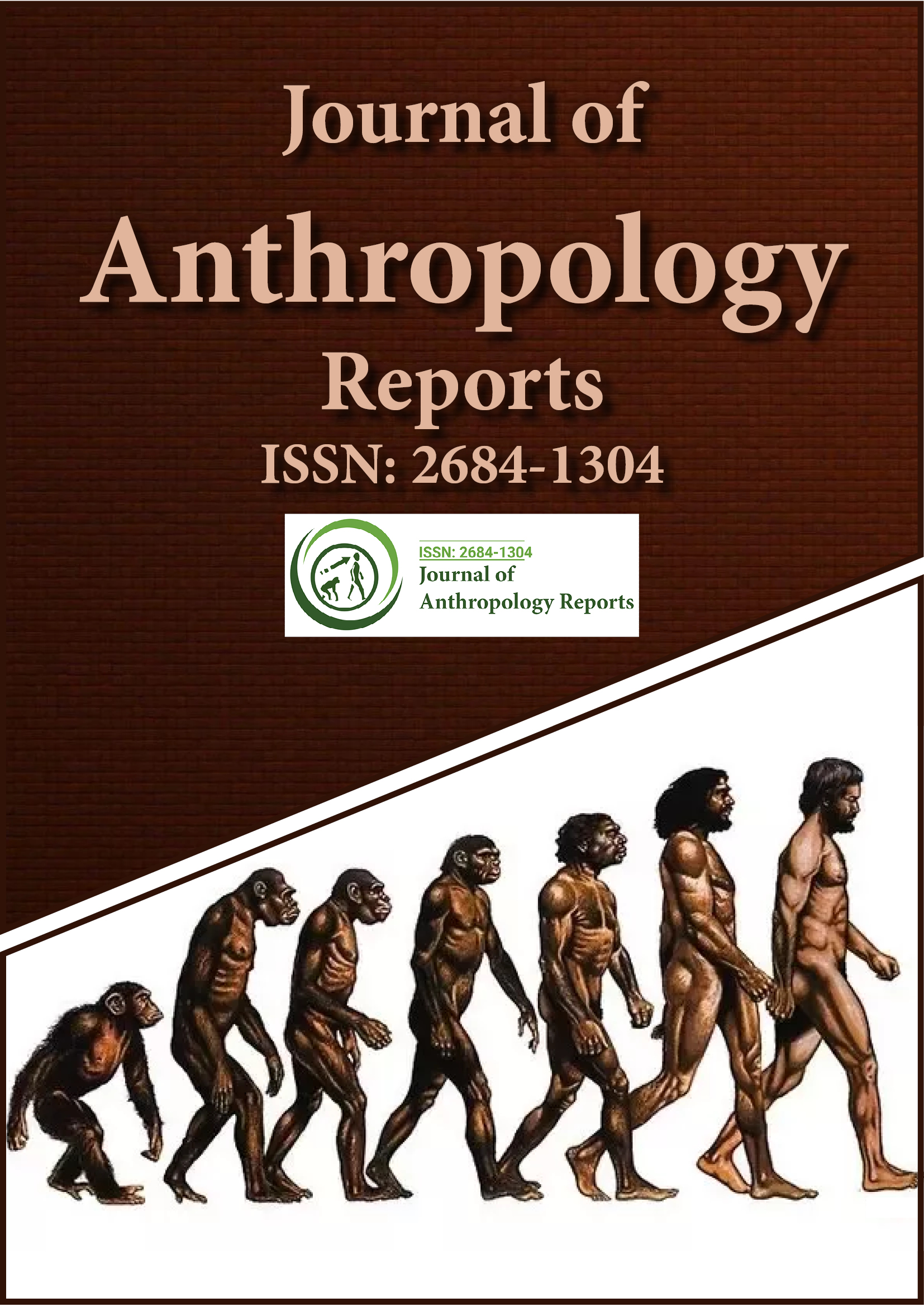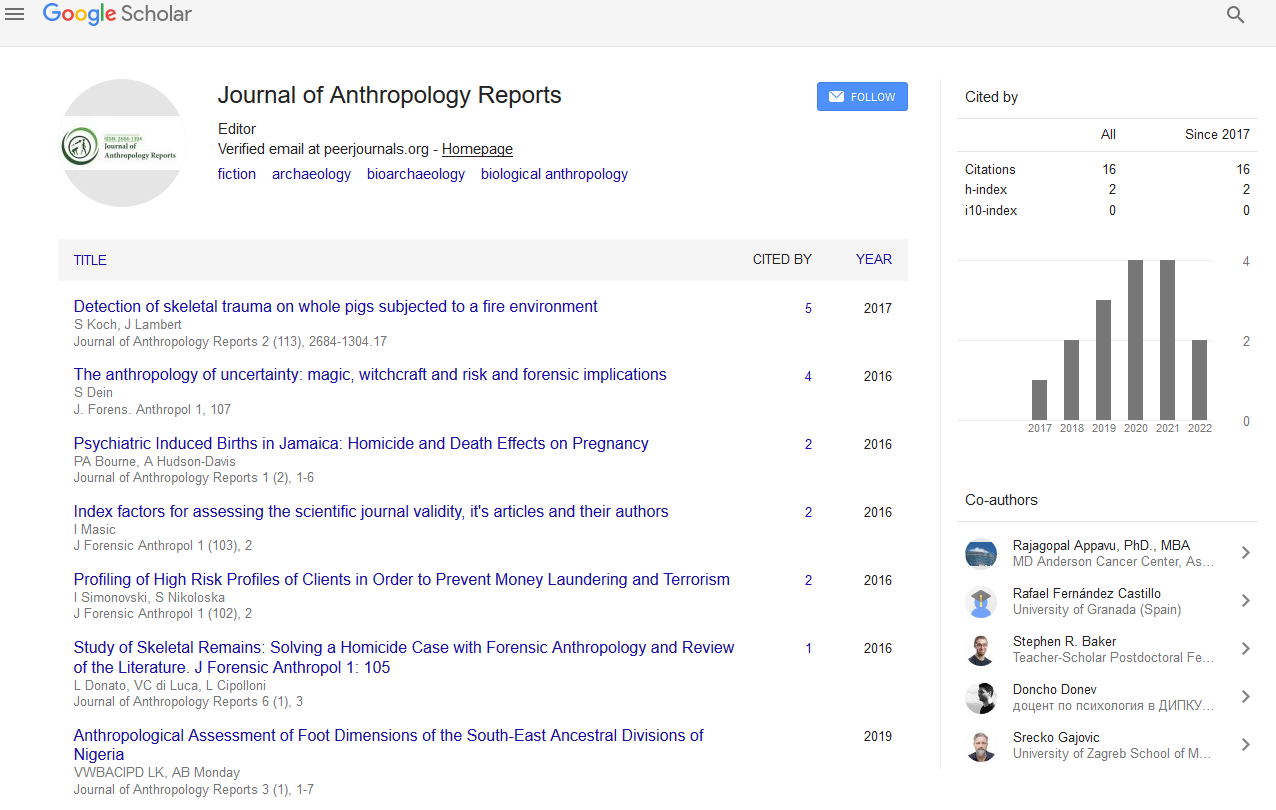Indexed In
- RefSeek
- Hamdard University
- EBSCO A-Z
Useful Links
Share This Page
Journal Flyer

Open Access Journals
- Agri and Aquaculture
- Biochemistry
- Bioinformatics & Systems Biology
- Business & Management
- Chemistry
- Clinical Sciences
- Engineering
- Food & Nutrition
- General Science
- Genetics & Molecular Biology
- Immunology & Microbiology
- Medical Sciences
- Neuroscience & Psychology
- Nursing & Health Care
- Pharmaceutical Sciences
Opinion Article - (2023) Volume 6, Issue 4
Conjectured Connections between Subfields of Anthropology and Studies of the Human Microbiome
Long Zhang*Received: 04-Dec-2023, Manuscript No. JFA-24-24560; Editor assigned: 06-Dec-2023, Pre QC No. JFA-24-24560 (PQ); Reviewed: 20-Dec-2023, QC No. JFA-24-24560 (QC); Revised: 27-Dec-2023, Manuscript No. JFA-24-24560 (R); Published: 04-Jan-2024, DOI: 10.35248/2684-1304.24.6.178
Description
The intricate fabric of human existence has long interesting anthropologists, who delve into the complexities of culture, evolution, and social structures. However, a relatively recent field of study, the human microbiome, has started to attract attention for its potential to transform our understanding of what it means to be human. In this opinion piece, we explore the potential connections between various subfields of anthropology and the evolving studies of the human microbiome.
Anthropology, as a discipline, encompasses cultural anthropology, archaeology, linguistic anthropology, and biological anthropology. Each examines various aspects of human existence, contributing unique perspectives to the broader understanding of our species. However, the emergence of the human microbiome as a major point of scientific inquiry has presented an opportunity for interdisciplinary collaboration, potentially restructure the way we approach anthropological research.
Cultural anthropology, traditionally concerned with the study of societies and their cultural practices, may find intriguing correlations with the human microbiome. Recent studies suggest that microbiota, the diverse array of micro-organisms residing in and on the human body, can influence behaviour and social interactions. Exploring how microbial communities may impact cultural norms or shape social structures could provide a novel lens through which to view cultural evolution. Archaeology, the study of human history through fossils and physical remains, may benefit from integrating microbiome research into its methodologies. The human microbiome has the potential to serve as a biological archive, preserving information about the health, diet, and lifestyle of past populations. Analysing ancient microbial DNA could offer new insights into the interactions between humans and their environment throughout history, shedding light on the evolutionary dynamics that have shaped both human societies and their microbial companions.
Linguistic anthropology, concerned with the study of language and communication, could explore the role of the microbiome in shaping language evolution. Research has shown that microbiota can influence neurological development, which in moving may impact of brain functions, including language acquisition. Investigating potential links between the microbiome and the development of Language diversity or the evolution of communication strategies within communities could open up new venues for understanding the interplay between biology and culture.
Biological anthropology, which traditionally focuses on the study of human evolution and variation, stands to gain from a deeper exploration of the human microbiome. Evolutionary processes have shaped the co-existence between humans and their microbial partners, influencing both our biology and the microbiome itself. By examining how the microbiome has evolved with Homo sapiens, biological anthropologists may uncover essential clues about the adaptive advantages provided by specific microbial communities throughout human evolution.
The integration of microbiome research into anthropology without any challenges. Ethical considerations, methodological standardization, and the need for cross-disciplinary collaboration presents challenges that must be navigated. However, the potential insights awaiting discovery make the effort worthwhile.
Moreover, understanding the impact of modern lifestyles on the human microbiome is important in the context of ongoing societal changes. Factors such as antibiotic use, diet shifts, and urbanization have been implicated in altering microbial diversity and composition. Anthropologists can contribute by examining how these changes intersect with cultural practices and societal structures, influencing not only individual health but also the collective well-being of communities.
In conclusion, the hypothesized connections between subfields of anthropology and studies of the human microbiome open up exciting possibilities for interdisciplinary exploration.
The symbiotic relationship between humans and their microbial partners, anthropologists can enhance our understanding of the intricate web of factors that have shaped and continue to shape our species.
Citation: Zhang L (2024) Conjectured Connections between Subfields of Anthropology and Studies of the Human Microbiome. J Anthropol Rep. 6:178.
Copyright: © 2024 Zhang L. This is an open-access article distributed under the terms of the Creative Commons Attribution License, which permits unrestricted use, distribution, and reproduction in any medium, provided the original author and source are credited.

